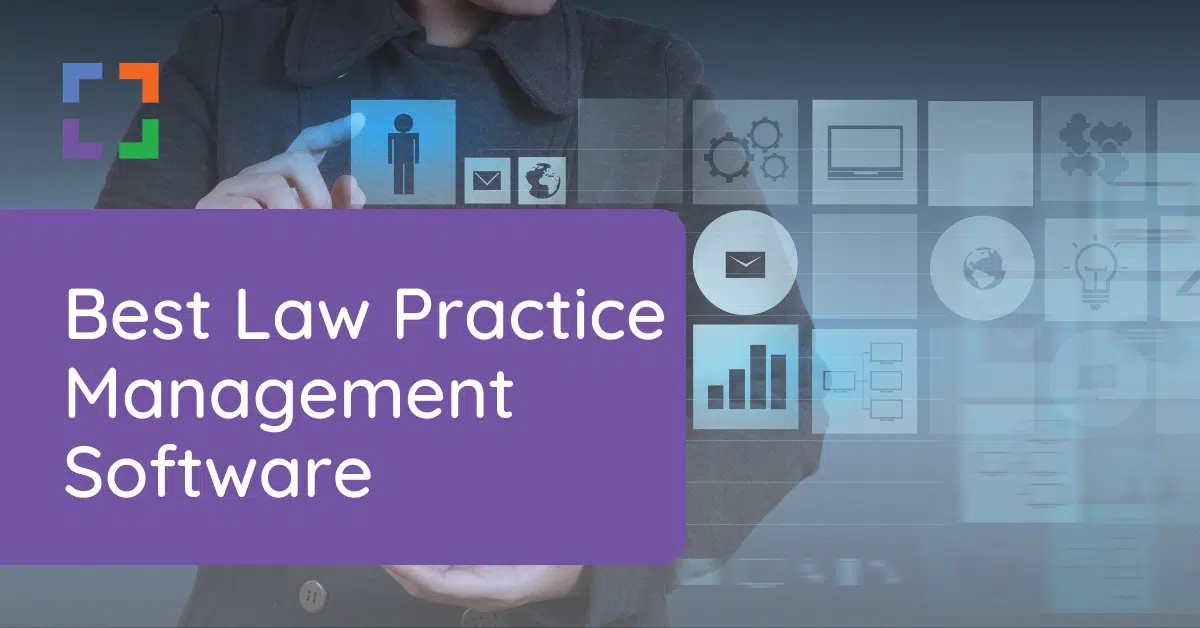Microsoft Teams for Law Firms

Law firms working to become more efficient and offer a better client experience are looking to tech tools for support. This is especially true in today’s work environment which requires ensuring a distributed workforce remains collaborative and productive.
Unfortunately, each app, tool, and service you add to your tech toolbox results in more complexity. And it often becomes a disjointed mess. Microsoft Teams is a great solution if you’re looking for a simple way to centralize your work and boost your team’s efficiency.
Teams is a powerful tool that’s more than just chat or messaging. When implemented properly, it can serve as the central nervous system of your law firm, bringing your entire team (regardless of where they work) together.
Whether you’re a seasoned MS Team’s user or a firm newly exploring its features, this guide will help you utilize this software to increase your firm’s efficiency.
In This Article
- Introduction to Microsoft Teams
- Introduction to Microsoft 365
- Security and Compliance in Microsoft Teams
- Microsoft Teams as the Hub of Your Law Firm
- Consolidate Separate Disjointed Tools
- Why Every Law Firm Should (Probably) Use Teams
- Visualize Microsoft Teams Within Your Law Firm
- How to Set Up Teams for Your Law Firm
- 7 Expert Tips for Using Microsoft Teams Within Your Practice
- Integrate Microsoft Teams With Your Practice Management Software
- Making Everything Work Together Seamlessly
- Tying it All Together
Introduction to Microsoft Teams
Microsoft Teams is an impressive part of Microsoft 365 (formerly known as Office 365). Just like the other apps inside Microsoft 365, Teams is cloud-based and available in-browser, with an installable desktop application, and via mobile devices.
At its core, Microsoft Teams is a collaborative chat and instant messaging app for teams, similar to other apps like Slack and Google Workspace. Of course, other features make Microsoft teams a great tool for law firms, including:
- Meetings and conferencing: Microsoft Teams offers several tools for hosting meetings and conferences across your practice. You can take advantage of online meetings, video conferencing, screen sharing, and even webinars. Easily schedule meetings, share meetings notes, invite guests, record meetings, and more all while benefiting from one-touch join and live chat.
- Calling: Teams enables voice and video calling on your computer, tablet, mobile device, or even desk phone if you still have one. Microsoft offers voice-over-IP (VoIP) and traditional PBX to fit your firm’s needs. Calling features include conferencing, call management, direct routing, call queues, contact center integration, and an auto attendant for when you can’t pick up. That means that Teams can double as your law firm’s phone system, if implemented in its entirety.
- Chat: Inside Microsoft Teams, you can send messages to individuals or groups, join a video call, or share your screen. Plus, you can message those within your law firm from anywhere using the easy mobile app. Teams also integrates with the other Microsoft 365 apps seamlessly, so you can chat while working on documents and files.
- File sharing: Law firms generate a lot of files. With Teams, you and the rest of your firm can collaborate on projects in real-time. Instant and automatic sync with version tracking also eliminates the mess that is multiple versions of a single document. Files, including those inside Word and PowerPoint, can be edited without ever leaving Teams and you can set permissions to protect your files from wandering eyes.
Related – LexWorkplace: Looking for cloud-based document management? Check out LexWorkplace: Born in the cloud, built for law firms.
- Channels: Inside Teams, you can create channels for specific teams, departments, or practice areas. This helps improve collaboration and reduce unnecessary distractions. Some examples of channels you could create include “All Partners” or “Family Law Practice.”
- Calendar: Teams includes a ton of calendaring features so you can easily track your meetings, calls, and more. For example, you and others in your firm can add meetings to calendars while inside Teams. Those meetings can then be synced across each meeting guest’s calendar without any additional effort.
- Tasks: Not only can you view your tasks from inside Teams, but you can also create new tasks from chat messages via Tasks Bot. For example, when your assistant sends you a message regarding a client call, you can easily create a task as a reminder for later.
- External collaboration tools: Via the guest access feature, Teams allows you to bring others from outside organizations into your channels easily, so they too can collaborate via chat, calling, and conferencing.
- Third-party integrations: Although Teams has all the tools necessary to be the hub of your firm, it also seamlessly integrates with other apps and software such as Asana and Clio Manage.
This is only a sampling of what Teams has to offer for your law firm. It’s also quite affordable when compared to other options out there.
If you already use Microsoft 365, you may already have access to Teams. It’s currently included inside Microsoft 365 Business Basic which runs $5.00 per user/month. It’s also included inside Microsoft 365 Business Standard which costs $12.50 per user/month.
Move Your Legal Software to the Cloud
With Uptime Practice
- Cloudify Your Legal Software
- Expert Legal Software Hosting/Support
- Cloud Storage for Documents + Data
- End-to-End Security
- Office 365 + IT Support (Optional)
Introduction to Microsoft 365
Microsoft 365 (also known as Office 365) is a cloud-based SaaS solution by Microsoft. It features essential productivity tools any business can use to boost efficiency and team productivity. In addition to Teams, Microsoft 365 also includes popular apps such as:
- Word
- Excel
- PowerPoint
- Outlook
- OneNote
- OneDrive
- SharePoint
- Microsoft Teams
Related – OneDrive for Law Firms: Thinking about OneDrive for your law firm? See tips, tricks, caveats and best practices.
Microsoft 365 offers many benefits for your firm, especially if you wish to move away from an on-premise server. For example, Microsoft 365 is cloud-based, so there’s no need to own a server that is costly and difficult to manage.
Microsoft 365 also features a predictable monthly cost, automatic updates, heightened security, and services that work anywhere on any device. It’s the perfect solution for a distributed team that must work between home, the courtroom, and the office.
Do I Need Microsoft 365 to Use Teams?
Not necessarily. The basic version of Teams is currently offered for free without a Microsoft 365 subscription. However, some of the best features of Teams involve the collaboration between the other Microsoft 365 apps.
If you’re a new firm owner looking for practice management solutions, you should consider moving forward with the complete version of Microsoft 365, including Teams. It’s a great way to seamlessly consolidate all of your practice needs, from contract creation to client communication.
Related – Office 365 for Law Firms: See our comprehensive guide on setting up Office 365 for law firms.
Security and Compliance in Microsoft Teams
Microsoft Teams is built on an enterprise-grade cloud, delivering the advanced security and compliance capabilities that are paramount for law firms.
Data Security
Data security is crucial for law firms, given the sensitive nature of the information they handle. Microsoft Teams does just that by encrypting data at rest and in transit.
Data at rest is data that is stored on the servers, while data in transit is data that is transferred over the network.
Microsoft Teams uses Advanced Encryption Standard (AES) 256-bit encryption, one of the strongest block ciphers available, to secure data.

Uptime Practice was a true miracle when the pandemic struck. We moved to Uptime Practice and were working immediately.
Todd Tracy – The Tracy Law Group, PLLC
Compliance Standards
Microsoft Teams is designed to meet a broad set of international and industry-specific compliance standards, such as ISO 27001, ISO 27018, SSAE16 SOC 1 and SOC 2, HIPAA, and EU Model Clauses.
Microsoft has a dedicated team of compliance professionals who continuously work to keep its services in compliance with the latest standards.
Access Controls
Microsoft Teams allows administrators to set access controls and permissions to ensure that only authorized individuals can access certain information.
Administrators can set user permissions at a granular level so that team members can access the information they need while restricting access to sensitive or confidential information.
Audit Log
Microsoft Teams maintains a comprehensive audit log that records every action taken within the platform. This is crucial for law firms as it allows them to track changes made to documents, see who accessed a document and when, and monitor the actions of team members.
Multi-Factor Authentication (MFA)
MFA is an access control method where a user is granted access only after successfully presenting two or more pieces of evidence (or factors) to an authentication mechanism.
Microsoft Teams supports MFA, ensuring that even if a user’s password is compromised, an attacker can’t access the account without the second form of authentication.
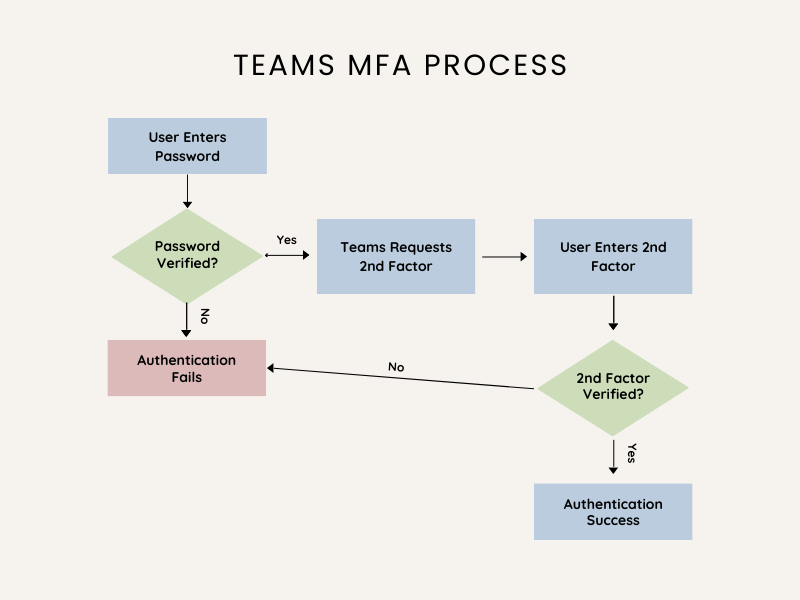
Microsoft Teams as the Hub of Your Law Firm
One of the best ways to use Microsoft Teams is to make it the hub or dashboard for the rest of your Microsoft 365 services, even those that go beyond communication.
For example, you can configure your Microsoft 365 in a way that enables access to your SharePoint and OneDrive shared folders within Teams. This way, everything is at your fingertips within one interface.
Inside Teams, from one simple dashboard, you can access your:
- Communication channels and chat rooms
- Events, client meetings, and appointments via your Outlook (Exchange) calendar
- Law firm’s files and critical documents via OneDrive or SharePoint
- Notes and books from OneNote
- Tasks and to-do items from Microsoft Planner and To-Do
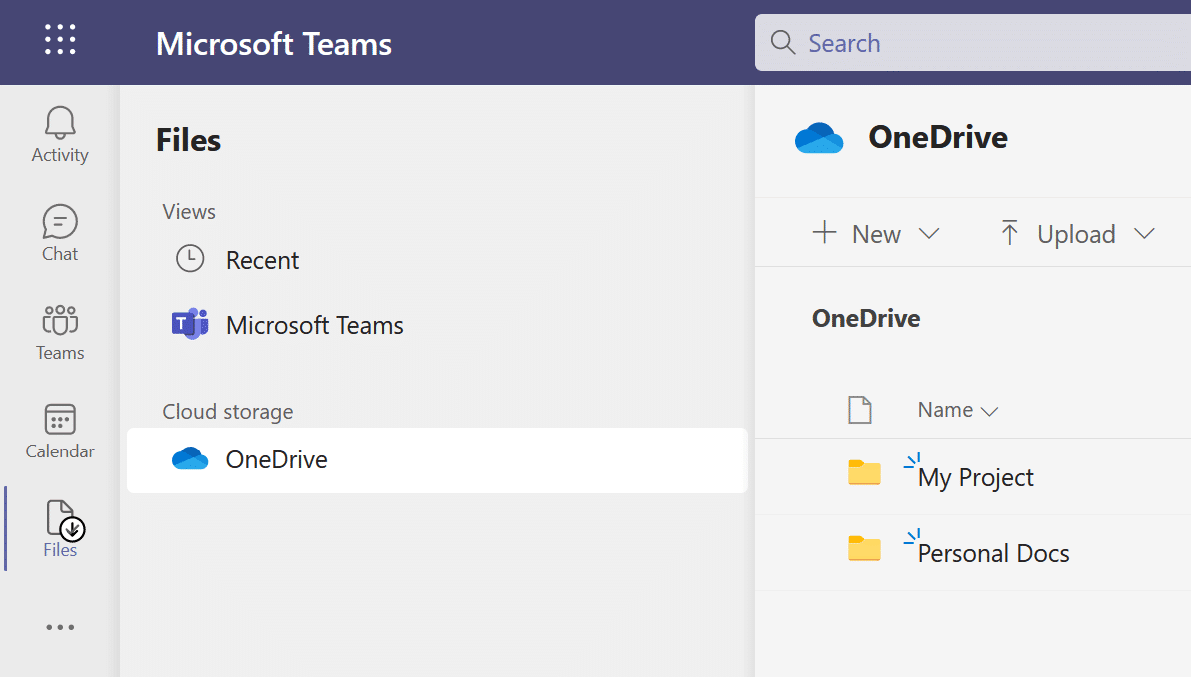
It’s also possible to connect other non-Microsoft 365 apps to Teams via connectors. For example, you could connect Google Drive or Dropbox for file storage, DocuSign for document signing, or even Trello for project management.
Consolidate Separate Disjointed Tools
One of the best benefits of using Microsoft Teams is consolidating all of your separate and disjointed apps and tools into one comprehensive platform. Believe it or not, you and your team spend more time than you realize on simple app switching.
According to a recent survey completed by Slack, 68% of app users say they spend at least 30 minutes per day switching between apps. And 56% report that switching between apps makes it harder to get essential work done.

Constant app switching leads to loss of momentum. It can also lead to data loss and costly mistakes if you’re not careful. And in today’s distributed workforce, it can make finding files, connecting to meetings, or simply looking up client information tedious. All those “where can I find ‘X’?” emails in your inbox add up, don’t they?
A tool like Microsoft Teams can help you avoid app switching, especially when using critical communication tools. For example, Teams removes the need to use Zoom, Webex, or GoToMeeting for online meetings, Skype for video calls, and Slack for instant messaging. Instead, all of those tools are available inside one simple app and can be used simultaneously for seamless collaboration.

Why Every Law Firm Should (Probably) Use Teams
Let’s recap. We believe that nearly every law firm out there can benefit from using Microsoft Teams. The benefits are plentiful:
- Use as a centralized hub for your law firm: From accessing client files to scheduling meetings with colleagues, you can do it all right from Teams. The app collaborates seamlessly with Microsoft 365 as well as other third-party apps.
- Consolidate multiple tools for seamless collaboration: Teams eliminates the need to have multiple communication tools. For example, you no longer need Slack and Instead, you can send chat messages and join video calls inside Teams.
- Keep your distributed team in sync: Whether you have team members working from home or you’re working while on the go, using Teams as your dashboard keeps all of you on the same page. Plus, the mobile app means you can take your law office anywhere.
- Maintain a sense of community with your firm: Gone are the days of working in your office without any human interaction until 5:00 p.m. Using Teams, your team can communicate throughout the day via chat and instant messaging. This can build a powerful sense of community which can lead to happier legal teams and a better work environment.
- Cut down on email clutter: Teams can also cut down on the number of “quick question” emails you receive. Simple conversations regarding clients, cases, and more can be had right within Teams instead of in email threads that clog your inbox.
- Make calls from any device: Teams enables you to make calls and more using any device, including your phone and your desktop. Regardless of where you are in the world, with an internet connection, you’ll never miss a beat.
- Send any document or file securely: When you need to send a quick document or file, you shouldn’t worry about doing so securely. Teams has a lot of security features built-in, including two-factor authentication and encryption of data in transit and at rest. Plus, files stored in SharePoint and OneNote are backed by their own encryption. You can trust your data to Microsoft 365 and Teams.
Prefer a Server-Based Software?
Use Uptime Practice to Host It!
- Get Your Firm's Software to the Cloud
- Access it From Anywhere
- Avoid Server Maintenance
- Pursue a Virtual Law Firm
- Get Included Support
Visualize Microsoft Teams Within Your Law Firm
It’s easy to read the benefits of Microsoft Teams and think it might be a good solution for your firm. Yet, to truly grasp what it can do, it’s important to visualize Teams inside your daily workflow. How can Teams impact your firm’s day-to-day tasks?
- Simplify teamwork on individual legal cases: Each legal case includes so many steps that involve multiple members of your legal team. Teams provides simple collaboration for creating documents, having meetings, and more from one interface. From initial discovery to pleading your client’s case in the courtroom, you and your team can do it all, together, inside Teams.
- Help encourage productive legal team meetings: Teams features the tools you need to streamline legal team meetings. For example, you can circulate to-do items and agendas before the meeting via instant messaging. And via the guest access feature, you can send the same materials to guests outside your firm. During your meeting, Teams will still be running in the background, so you can easily access case documents and files, send questions and requests to paralegals via chat, and even share your screen with colleagues.

- Eliminate document “lockouts”: The document and files library inside Teams is a SharePoint library. This means multiple people can collaborate on a single document at the same time, eliminating “lockouts” due to your colleague or assistant having the file open on their desktops. And yes, there’s automatic version tracking built right in, so you don’t have to worry about accidental changes.
- Discover remote possibilities for mediation: Many law firms are getting creative to meet the demands of a remote workforce, including those who offer mediation to their clients. Microsoft Teams can handle mediation through private and group channels. For example, the general channel can be used for all parties and two private channels can be created for each separate party to use during negotiations.
- Use a virtual whiteboard for brainstorming and collaboration: During meetings, you can use the whiteboard tool inside Teams to create legal diagrams and brainstorm ideas. Plus, you’ll be able to save and share your whiteboard once you’re finished. You’ll find the tool by selecting the Share icon inside your meeting.
How to Set Up Teams for Your Law Firm
Ready to take advantage of Microsoft Teams within your law firm? If so, there are a few steps you must take to ensure you make the most of your new tool. Let’s dive right in.
First things first, let’s review some key Teams terms you should know before you get started:
- Groups: In Microsoft 365, a group is the basic building block of organization within the suite. These are set outside of Teams and apply to all of Microsoft 365. Some firms will create groups based on groups of people or resources. For example, “Partners” or separate practice areas.
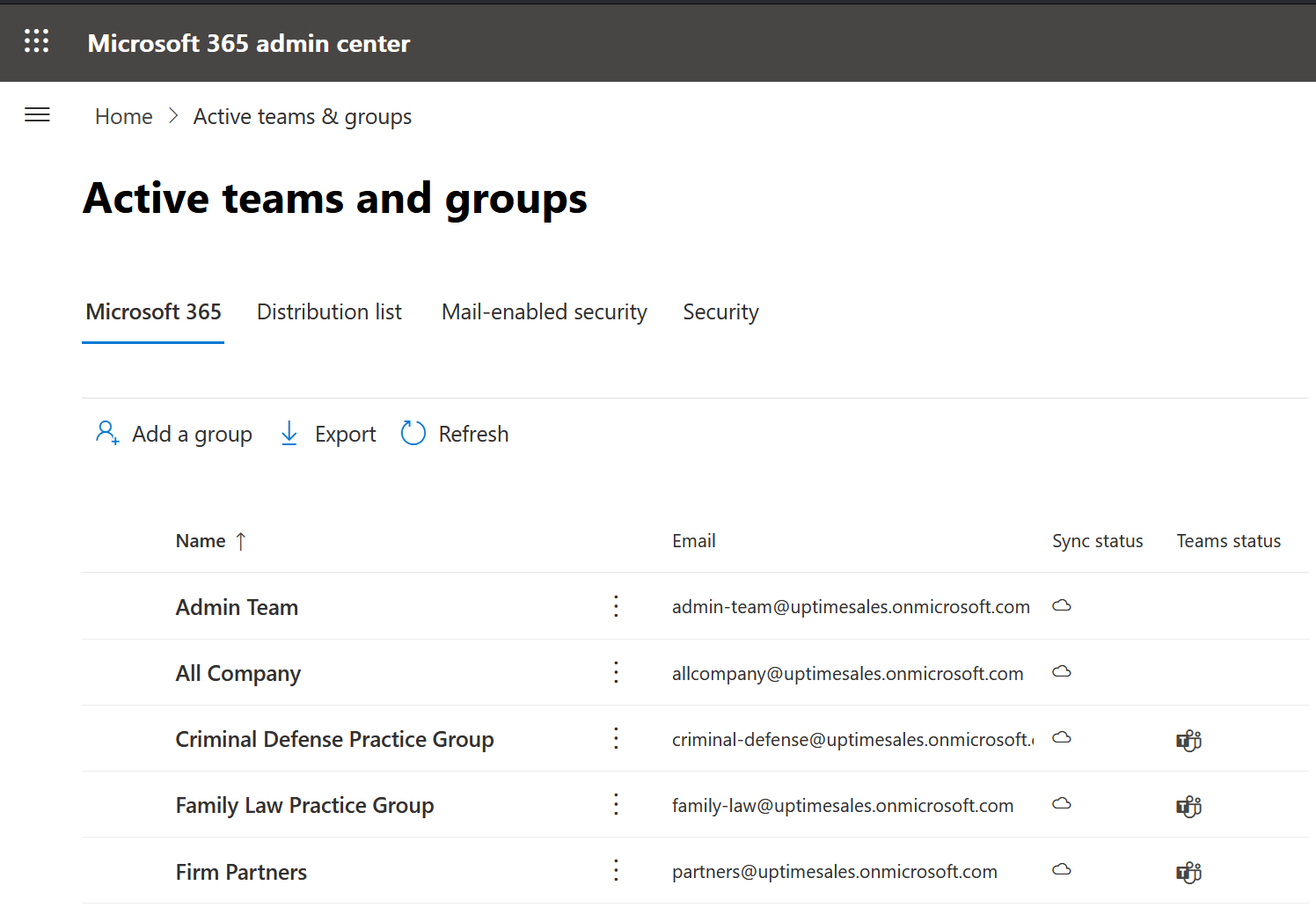
- Teams: Teams are Microsoft Teams specific and are a group of people, conversations, files, and tools. Inside each team, you’ll find all of the relevant channels.
- Channels: Channels are discussions within each team that are often dedicated to a specific matter, topic, or project.
1. Set Up Teams With Microsoft 365
We recommend setting Teams up with Microsoft 365, not in a vacuum. Otherwise, you’ll double your work, and your overall Microsoft 365 system may become disjointed. You’ll want your Teams to follow the same organizational structure as the rest of your Microsoft 365 suite.
Start by determining which Microsoft 365 option is right for your firm then, move forward through the installation process.
2. Start With Microsoft Groups
During the installation process, you’ll have the opportunity to create groups for your entire 365 suite. This is a critical step in determining how you work within Teams. A group can be any logical group of people or resources that make sense for your firm.
Some examples of groups you could create include:
- Partners
- Paralegals or support staff
- Teams and departments
- Marketing or other functions
- Practice areas (i.e., family law or criminal defense)
To determine which groups you require, make a list of the groups that require their own dedicated resources such as specific documents, calendars, or folders. For easy collaboration and organization, you’ll want to keep resources as separate as possible.
Let’s review an example group setup. Say your law firm has a total of eight people, including two partners, two associates, two paralegals, and two administrative support people. And your firm practices both business law and family law. The following groups might be a perfect mix for your firm:
- General for your entire firm
- Partners (For Partners only)
- Admin (For legal support and administrative staff)
- Family Practice
- Business Practice
Once you decide which groups make the most sense for your firm, you’ll want to assign the appropriate team members to their groups. For example, your partners should have access to all of the groups while administrative staff will need access to the Admin channel, general channel, and your practice area groups.
Tip: For step-by-step instructions on how to define groups within Microsoft 365, read this post from Microsoft.
3. Set Up a Team for Each Practice Area or Functional Group
The next step is to set your teams inside Microsoft Teams. We recommend creating a team for each practice area or functional group that will require constant contact. For example, you may set up a team for:
- Firm Partners
- Family Law Practice Group
- Criminal Defense Practice Group
- Admin Staff
After you create your teams, go ahead and invite each individual within your firm to their specific teams.
Tip: For step-by-step instructions on how to create teams within Microsoft Teams, read this post from Microsoft.
4. Create Channels for Each Individual Matter
When you get started with Teams, you’ll automatically have a general channel that everyone within your firm can use for general team banter, announcements, or communication. Even still, we recommend creating channels for each individual matter within your set teams.
This ensures communications are streamlined and all in one place for each matter. Plus, you can pin specific tabs to each channel that include tools such as SharePoint or individual files, so team members can find case materials quickly.
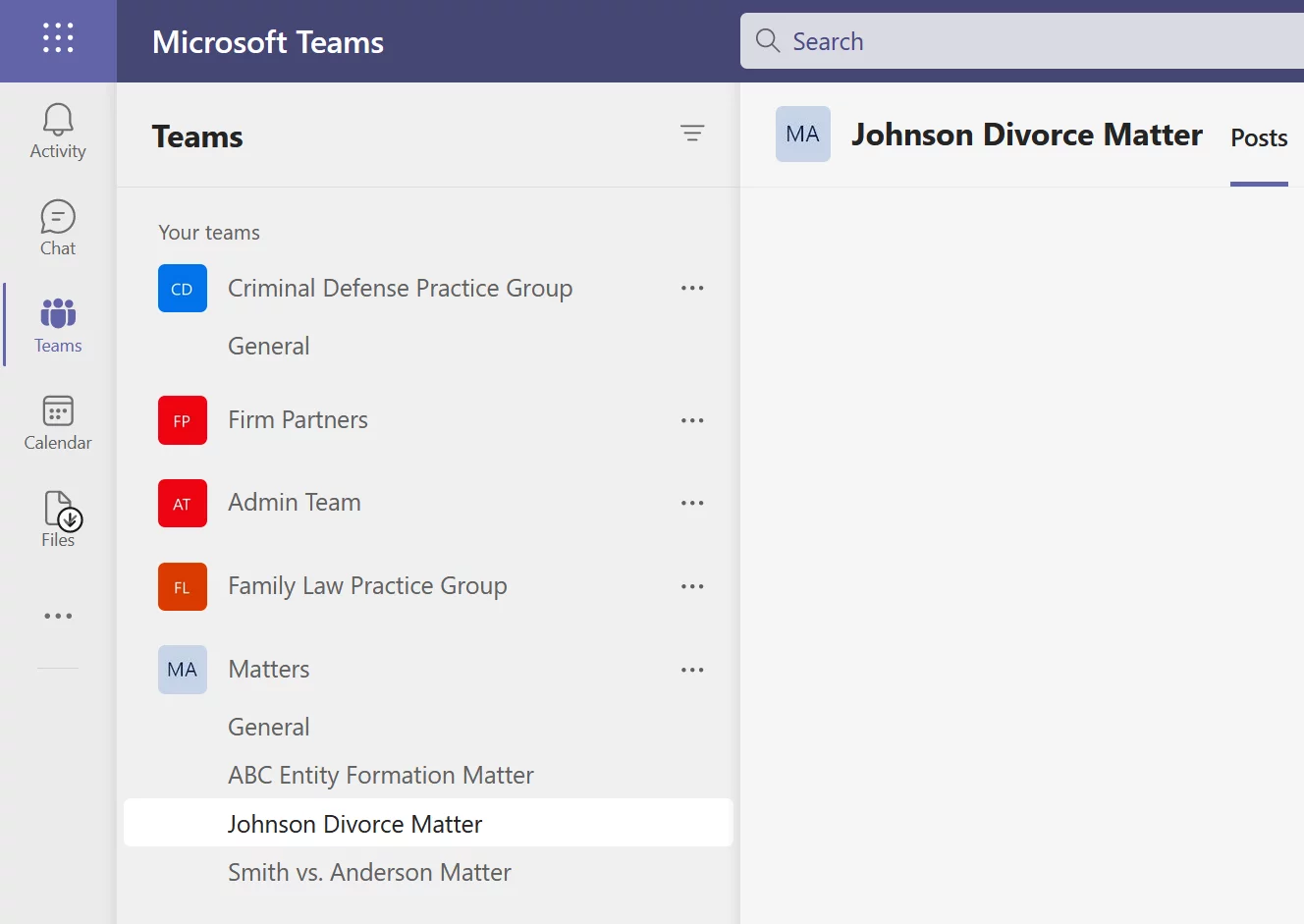
7 Expert Tips for Using Microsoft Teams Within Your Practice
Microsoft Teams is incredibly easy to use with a minimal learning curve. Plus, there are plenty of tips and tricks you can use to make Teams even more efficient for your practice.
- Try keyboard shortcuts: There are many keyboard shortcuts you can use to quickly navigate Teams. For example, “Ctrl+N” on Windows or “Command+N” on Mac will start a new chat.
- Forward emails to Teams channels: You can easily track emails that involve specific client matters by forwarding them to Teams channels. You’ll find your channel’s email address under More Options inside the channel. Then, simply forward the email to the address.
- View meeting transcripts: During a Teams meeting, you can turn on live transcription to see an on-screen transcript. You can also download transcripts for your meetings inside Teams. This is a great way to share meetings with members who were unable to attend.
- Start a call inside chat: Need to clarify a message sent from a colleague? Hop on a call from right inside the chat. Simply select Meet inside the channel to start your call.
- Set your status: Want to show others you’re unavailable? Set your status in Teams. You can also include a status message that instructs your team on who to reach out to with questions or concerns.
- Mark messages as unread for easy follow-up: Marking a message as unread will enable you to easily come back to the message later. This is a great tool for when you’re working on the go and need to do further research before replying.
- Use the various Teams commands: Much like keyword shortcuts, commands are a simple way to perform tasks inside of Teams. To use a command, you’ll simply type “/” and then your chosen command. For example, “/away” will set your status to away. And “/unread” will show all of your unread messages inside Teams.

Expert Recommendation: Integrate Microsoft Teams With Your Law Practice Management Software
Microsoft Teams can handle all internal and external communications for your firm and can act as the dashboard for all your other Microsoft 365 tools. However, you’ll need more to successfully run your firm. We recommend integrating Teams with your existing law practice management software, if possible.
Related – Best Law Practice Management Software: Evaluating legal software? Check out our list of the Best Law Practice Management software this year.
If you don’t have LPM software as of yet, it’s time to find the best fit for your firm. LPM software should include critical firm management tools and features such as:
- Client and contact management
- Matter management
- Calendaring
- Task management
- Time and expense tracking
- Billing
- Conflict checking
- Business accounting
- Trust accounting
- Document assembly, automation, management, and storage
- Email management
- Client portal and mobile app
The LPM you choose should also integrate seamlessly with your other necessary third-party apps such as Microsoft Teams. While this may seem obvious, it’s easy to forget.
Making Everything Work Together Seamlessly
Microsoft Teams (or any law firm software for that matter) won’t magically organize itself right out of the box. To best benefit your law firm, it’s best to reach out to a legal technology professional who can help you implement Microsoft Teams alongside the rest of the Microsoft 365 suite.
General IT consultants and companies are rarely suited to meet the unique needs of a law firm. Uptime Legal has helped hundreds of law firms and thousands of legal professionals streamline and level up their practice using technology tools such as Microsoft Teams.
Related – Managed IT Services for Law Firms: Explore Managed IT Services for Law Firms: Boost efficiency, enhance security, and ensure compliance with specialized IT support.
Frequently Asked Questions
Microsoft Teams uses Advanced Encryption Standard (AES) 256-bit encryption to secure data both at rest and in transit. Additionally, it allows administrators to set access controls and permissions, supports Multi-Factor Authentication (MFA) and maintains a comprehensive audit log of all actions taken within the platform.
Yes, Microsoft Teams allows administrators to set access controls and permissions at a granular level. This ensures that team members have access to the information they need while restricting access to sensitive or confidential information.
Yes, Microsoft Teams is designed to meet a broad set of international and industry-specific compliance standards, such as ISO 27001, ISO 27018, SSAE16 SOC 1 and SOC 2, HIPAA, and EU Model Clauses.
Yes, Microsoft Teams can be integrated with many popular practice management software solutions. This allows you to streamline your workflows and have all your essential tools in one place.
Microsoft provides comprehensive support for Teams, including a detailed help center, community forums, and premium support options.
Uptime Practice:
The IT & Cloud Platform for Law Firms.
Uptime Practice is a suite of Managed IT and cloud services, made exclusively for law firms.
Practice Next
Technology + Legal Software Support for Modern Law Firms
Practice Next is a suite of Managed IT, Legal Software Support, and Cloud Essentials, made just for law firms.
-
Practice Next is a suite managed IT, technology essentials and legal software support.
-
Practice Next includes unlimited IT and legal software support, Microsoft 365, legal-centric cloud storage and more.
-
Practice Next pairs great with cloud-based legal software such as Clio Manage, CosmoLex, MyCase and more.
Practice Go
Cloudify Your Legal App
Does your law firm already have a cloud strategy, but have one premise-based application still running on onsite servers? Practice Go is for you.
- With Practice Go, we effectively turn your desktop/server- based legal software into a cloud application (a Published App), freeing your firm from the limitations of traditional software.
- Practice Go can cloudify your PCLaw, Time Matters, Tabs3, ProLaw, Juris, QuickBooks and more.
Practice Foundation
Complete Private Cloud for Law Firms
If your law firm needs a central, secure cloud platform for all of your legal software, documents and data, Practice Foundation is for you.
-
Practice Foundation is an end-to-end cloud platform that will host all of your firm's applications and documents, and will optionally include Office 365 + unlimited IT support. Everyone in your firm logs into a Virtual Desktop where they'll find all of their apps and docs.
-
Practice Foundation works with PCLaw, Time Matters, Tabs3, ProLaw, Juris, QuickBooks, Timeslips, TrialWorks, Adobe Acrobat and more.
Not Sure Which Edition You Need?
No problem. Check out our quick Comparison Chart for Uptime Practice, or Get in Touch to talk with our sales team.

Dennis Dimka
As the founder and CEO of Uptime Legal Systems, I've had the privilege of guiding our company to become a leading provider of technology services for law firms.
Our growth, both organic and through strategic acquisitions, has enabled us to offer a diverse range of services, tailored to the evolving needs of the legal industry.
Being recognized as an Ernst & Young Entrepreneur of the Year Finalist and seeing Uptime Legal ranked among the Inc. 5000 list of fastest-growing private companies in America for eight consecutive years are testaments to our team's dedication.
At Uptime Legal, we strive to continuously innovate and adapt in the rapidly evolving legal tech landscape, ensuring that law firms have access to the most advanced and reliable technology solutions.
Related Posts
September 30, 2024
How to Properly Utilize the 2024 Legal Software Report
June 27, 2024
The Impact of Remote Work on Law Firm IT
March 13, 2024
Law Firm Collaboration Software
February 8, 2024
Legal Data Management & Storage Solutions for Law Firms
January 9, 2024
VoIP for Law Firms
November 15, 2023
Outsourced IT for Law Firms
October 24, 2023
AWS for Law Firms: A Complete 101
October 4, 2023
Azure for Law Firms: A Complete 101
March 8, 2023
What is Legal Document Management?
December 22, 2022



